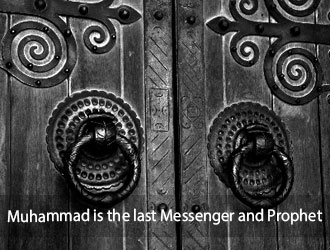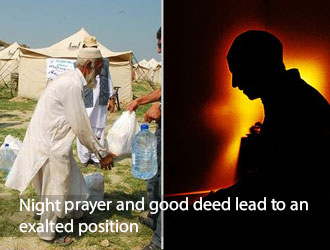- Islamic creed
- /
- Islamic creed
Deductions from the Quran concerning belief in Messengers
1- Prophethood and Messengerhood are Divine Bounty and Selection
The subject of last lecture was about the obligation of believing in Prophets and Messengers, peace be upon them. I clarified that belief in Prophets and Messengers is one of the pillars of the Islamic Aqeedah, and it is one of the basics of Islam which should be definitely embraced by everyone. Whoever does not believe in Prophets and Messengers is a disbeliever, because this pillar is one of Usul Ad-Deen (Fundamentals of Islam). Actually, the study of the Islamic Aqeedah is also called the study of Usul Ad-Deen. Islam has Usul and Furu' (Branches of Islam), and the belief in Prophets and Messengers is one of Usul Ad-Deen. Considered the following matters which are deduced from the Noble Quran concerning believing in Messengers:
First, both Prophethood and Messengerhood are Divine Bounty and Divine Selection; they cannot be acquired, but rather they are gifts from Allah the Almighty. Some people mistakenly think that Allah grants them to anyone, and this is the point I want to clarify in this lecture. If someone performs great righteous deeds, he will not be a Messenger unless Allah the Almighty chooses him. However, when Allah the Almighty chose His Messengers, He selected those who were top (with regards to their high morals and exemplary characters) among other people.
Humans have different qualities, and the Prophets, peace be upon them, have the most perfect qualities ever. The Prophet is the one who always turns to Allah the Almighty, and he is the one whose eyes sleep but his heart never sleeps (his heart is always active through worshiping Allah and remembering Him). Allah the Almighty selects His Prophets and Messengers, which means that Prophethood and Messengerhood are Divine Bounty and Selection. This merit is never gained by worshipping Allah intensively.
Some people say that the noble companions were charmed by the Prophet, peace be upon him, but what does that mean? It means they were enormously influenced by his high morals, perfect manners, modesty, justice, mercy, kindness, pure love for people, forbearance and love for goodness. Actually, these high morals prove that Prophethood is a Divine choosing or a Divine Selection.
2- Prophethood and Messengerhood differ from each other
The second point is that Messengerhood and Prophethood are not the same; there is a Prophet and there is a Messenger. The proof of that is the following Noble Ayah in which Allah the Almighty describes Prophet Musa as a Messenger and as a Prophet, which indicates that these two descriptions have different meanings according to the Islamic terminology, Allah the Almighty says in Surat Maryam:
"And mention in the Book (this Quran) Musa (Moses). Verily! He was chosen and he was a Messenger (and) a Prophet."
Thus, Messengerhood is different from Prophethood. Another proof can be found in the following Noble Ayah in which Allah the Almighty says:
"Never did We send a Messenger or a Prophet before you, but; when he did reauthor the revelation or narrated or spoke, Shaitan (Satan) threw (some falsehood) in it. But Allah abolishes that which Shaitan (Satan) throws in. Then Allah establishes His Revelations. And Allah is All-Knower, All-Wise:"
3- The selection for Prophethood precedes the selection for Messengerhood
The third thing which we conclude from the Noble Quran concerning Prophethood and Messengerhood is that the selection for Prophethood comes before the selection for Messengerhood. Messengers were selected to be Messengers after they had been selected to be Prophets. In other words, every Prophet is a Messenger but it is not vice versa; every Messenger is definitely a Prophet, but every Prophet is not a Messenger. There are many Ayat in the Noble Quran which indicate this point. One of them is the Noble Ayah below in Surat Az-Zuikhruf in which Allah the Almighty says:
"And how many a Prophet have We sent amongst the men of old."
This means they were first chosen as Prophets, and then they were sent to their people as Messengers. Allah the Almighty says:
"And how many a Prophet have We sent amongst the men of old."
As for our Prophet Muhammad, peace be upon him, Allah the Almighty says:
"O Prophet (Muhammad PBUH)! Verily, We have sent you as witness, and a bearer of glad tidings, and a warner, * And as one who invites to Allah [Islamic Monotheism, i.e. to worship none but Allah (Alone)] by His Leave, and as a lamp spreading light (through your instructions from the Quran and the Sunnah the legal ways of the Prophet PBUH)."
"And how many a Prophet have We sent amongst the men of old."
Allah the Almighty says:
"O Prophet (Muhammad PBUH)! Verily, We have sent you as a witness, and a bearer of glad tidings, and a warner,"
These two Noble Ayat indicate that Prophethood comes before Messengerhood, which means the  Prophet is chosen by Allah to receive the Revelation, then he is ordered to proclaim what has been sent down to him. In other words, the Prophet who is also a Messenger may remain only a Prophet for a while, but when he is ordered to announce what has been sent down to him, he becomes a Messenger. Allah the Almighty addressed the Prophet, peace be upon him, in the Noble Ayah below saying:
Prophet is chosen by Allah to receive the Revelation, then he is ordered to proclaim what has been sent down to him. In other words, the Prophet who is also a Messenger may remain only a Prophet for a while, but when he is ordered to announce what has been sent down to him, he becomes a Messenger. Allah the Almighty addressed the Prophet, peace be upon him, in the Noble Ayah below saying:
"O you (Muhammad PBUH) enveloped (in garments)!* Arise and warn!"
It was narrated that when this Noble Ayah was sent down to the Prophet, peace be upon him, he threw off his blanket, and wanted to go to his people to proclaim what had been sent down to him. Mrs. Khadijah, may Allah be pleased with her, asked him to stay in his bed, but he said the following words which will not be comprehended properly, but by the one who has experienced them: "O Khadijah, the time for sleep and rest is over"
Muslims should compete for the ranks of Paradise
There are many high religious positions which you can compete for, such as the position of being a caller to Allah the Almighty or of being a righteous knowledgeable scholar.
Consider the following saying which was mentioned in the relic:
"O son, there are three kinds of people: one kind is of those learned people who are highly versed in the ethics of truth and philosophy of religion, second is the kind of those who are acquiring the above knowledge and the third is that class of people who are foolish. They follow every pretender and accept every slogan, they have neither acquired any knowledge nor have they secured any support of firm and rational convictions. Beware Kamil that you will not be like anyone of them."
You can seek Islamic knowledge at every time. Allah the Almighty says:
"And We sent not (as Our Messengers) before you (O Muhammad PBUH) any but men, whom We inspired, (to preach and invite mankind to believe in the Oneness of Allah). So ask of those who know the Scripture [learned men of the Taurat (Torah) and the Injeel (Gospel)], if you know not."
Those who know the Scripture are the religious scholars. Whoever wants to be saved from the Hellfire should act upon Allah's Order, while the one who seeks the high ranks in Paradise should be among the foremost whom are mentioned in the following Noble Ayah in which Allah the Almighty says:
"And those foremost [(in Islamic Faith of Monotheism and in performing righteous deeds) in the life of this world on the very first call for to embrace Islam,] will be foremost (in Paradise).* These will be those nearest to Allah."
"The last thereof (that wine) will be the smell of musk, and for this let (all) those strive who want to strive (i.e. hasten earnestly to the obedience of Allah)."
This is the type of competition which Allah the Almighty loves.
I wish, with all my heart, that you do not only hope to save yourselves from the Hellfire, but rather to reach the highest ranks of Paradise. No one can seek the position of Prophethood or Messengerhood as there will be no Prophet after Prophet Muhammad, peace be upon him. However, you can seek the position of being a Wali (an absolutely devoted worshipper of Allah) till the Day of Resurrection. Allah the Almighty says:
"No doubt! Verily, the Auliya' of Allah [i.e. those who believe in the Oneness of Allah and fear Allah much (abstain from all kinds of sins and evil deeds which he has forbidden), and love Allah much (perform all kinds of good deeds which He has ordained)], no fear shall come upon them nor shall they grieve,* Those who believe and are cautious. "
Your life and youth should be dedicated to worshipping Allah, and your energy, capabilities and wealth should be invested in pleasing Allah the Almighty. When you do this, you will be the winner and the truly successful person. Allah the Almighty says:
"Successful indeed are the believers.* Those who offer their Salat (prayers) with all solemnity and full submissiveness."
"Indeed whosoever purifies himself (by avoiding polytheism and accepting Islamic Monotheism) shall achieve success, * And remembers (glorifies) the Name of his Lord (worships none but Allah), and prays (five compulsory prayers and Nawafil additional prayers)."
"He will direct you to do righteous good deeds and will forgive you your sins. And whosoever obeys Allah and His Messenger (PBUH) he has indeed achieved a great achievement (i.e. he  will be saved from the Hell-fire and made to enter Paradise)."
will be saved from the Hell-fire and made to enter Paradise)."
If the one who obeys Allah the Almighty feels that he lives in misery, this shows his unawareness; he is unaware of what he has been granted.
"The person who reauthors the Quran and thereafter thinks to himself that someone else has been granted a bounty greater than this bounty (the bounty of being able to reauthor the Quran), then, without doubt, he has despised something that Allah Ta'âlâ has elevated."
"And when he [Yusuf (Joseph)] attained his full manhood, We gave him wisdom and knowledge (the Prophethood), thus We reward the Muhsinun (doers of good)"
If you ask me about the highest rank man may gain in this worldly life, I will tell you that it is to be among those whom Allah the Almighty is pleased with. Thus, whoever gains the Satisfaction of Allah the Almighty has achieved the highest rank in this life. Verily the true believers are the owners (the dwellers) of Paradise. Allah the Almighty says:
"That home of the Hereafter (i.e. Paradise), We shall assign to those who rebel not against the truth with pride and oppression in the land nor do mischief by committing crimes. And the good end is for the Muttaqun "
Hence, you can compete for the position of being a Wali or of being among those foremost (in Islamic Faith of Monotheism and in performing righteous deeds), because Allah the Almighty Who is the Lord of Prophet Musa (Moses), Prophet Harun (Aaron), Prophet Ibrahim (Abraham) and Prophet Muhammad, peace be upon them, and his noble companions is also Our Lord (He may select you as a Wali just as He selected them as Prophets). You can compete for performing righteous deeds or purifying your soul. Allah the Almighty loves you when you compete for obeying Him.
Muslims should not compete for the worldly life:
On the other hand, competing for the transient things in this worldly life, for its false enjoyments, desires, adornments, earnings, wealth, houses, orchards and vehicles, and for possessing fabulous wealth in it is disapproved by Allah the Almighty. He says:"For the like of this let the workers work."
"Say: "In the Bounty of Allah, and in His Mercy (i.e. Islam and the Quran); -therein let them rejoice." That is better than what (the wealth) they amass."
rejoice." That is better than what (the wealth) they amass."
Ask me what I am extremely pleased with, and I'll answer you who you are to ask me such a question. Someone who makes his living legally may feel pleased with the worldly things he posses, but what does this pleasure indicate? -It indicates that he is oblivious to his mission in this life. Accordingly, whoever is glad to collect money, even in a lawful way, does not know the purpose of his existence, nor does he deeply believe that he will leave this life when his death comes, and that nothing will benefit him in his grave except his righteous deeds. Actually, Fir'aun (Pharaoh) and Qarun (Korah) were fabulously wealthy although Allah the Almighty does not like them. He may grant wealth to those whom He doesn't like. He says:
"Verily, Qarun (Korah) was of Musa's (Moses) people, but he behaved arrogantly towards them. And We gave him of the treasures, that of which the keys would have been a burden to a body of strong men. When his people said to him: "Do not be glad (with ungratefulness to Allah's Favours). Verily! Allah likes not those who are glad (with ungratefulness to Allah's Favours)."
Allah the Almighty does not like those who are pleased with this worldly life, but rather He likes those who are glad with Allah's Satisfaction with them.
Ask Allah to fulfill your need
If you wake up suddenly at night, at four and a half for example; three quarters of an hour before Al-Fajr prayer, will you simply go back to sleep, or you will take away your blanket and perform some supererogatory Rakat of the night prayer to supplicate Allah the Almighty in private and ask Him to fulfill your needs? Allah the Almighty says:
"Perform As-Salat (Iqamat-as-Salat) from mid-day till the darkness of the night (i.e. the Zuhr, 'Asr, Maghrib, and 'Isha' prayers), and reauthor the Quran in the early dawn (i.e. the morning prayer). Verily, the recitation of the Quran in the early dawn is ever witnessed (attended by the angels in charge of mankind of the day and the night). * And in some parts of the night (also) offer the Salat (prayer) with it (i.e. reauthor the Quran in the prayer), as an additional prayer (Tahajjud optional prayer Nawafil) for you (O Muhammad PBUH). It may be that your Lord will raise you to Maqaman Mahmuda (a station of praise and glory, i.e. the highest degree in Paradise!)."
 Abu Sa'eed and Abu Hurairah, may Allah be pleased with them, narrated that the Prophet, peace be upon him, said:
Abu Sa'eed and Abu Hurairah, may Allah be pleased with them, narrated that the Prophet, peace be upon him, said:
"Allah the Almighty waits till when one-third of the first part of the night is over; He descends to the lowest heaven and says: 'It there anyone asking for forgiveness? Is there any repentant? Is there any petitioner (for mercy and favor)? Is there any solicitor?'till it is daybreak."
I'll give you this piece of advice: Whoever wants to ask Allah to fulfill his need, he should perform some supererogatory prayers at night and ask Allah to fulfill his need during prostration, because at this time the Creator of the universe says to you: Is there anyone asking so that I fulfill his need?
Pay attention to the following lines from a poem:
Don't ask people to fulfill your needs but rather
ask the One Whose Doors are never closed before you
Allah the Almighty is angry with the one who never calls Him
to fulfill his needs, while people get angry with whoever asks them for that.
Thabet Al-Banani narrated that the Prophet, peace be upon him, said:
"Let one of you ask his Lord concerning his needs until he asks him even for a shoestring when his breaks."
You should ask Allah for everything. He says:
"And your Lord said: "Invoke Me, [i.e. believe in My Oneness (Islamic Monotheism)] (and ask Me for anything) I will respond to your (invocation). Verily! Those who scorn My worship [i.e. do not invoke Me, and do not believe in My Oneness, (Islamic Monotheism)] they will surely enter Hell in humiliation!"
Do not you have any need concerning this worldly life or the Hereafter?
"O Khadijah, the time for sleep and rest is over".
Allah the Almighty says:
"O you (Muhammad PBUH) enveloped (in garments)!* Arise and warn!"
He also says:
"O Messenger (Muhammad PBUH)! Proclaim (the Message) which has been sent down to you from your Lord. And if you do not, then you have not conveyed His Message. Allah will protect you from mankind. Verily, Allah guides not the people who disbelieve."
4- Specific matters related to Prophethood
The fourth point which we deduce from the Noble Ayat related to Prophethood is that Allah the Almighty chose some people to be Prophets, not Messengers, i.e. He did not order them to convey a message. Therefore, they are called Prophets, not Messengers. The mission of the Prophet who was not ordered to proclaim a message is to follow the laws of the Messenger who was sent before him and to give the ruling on everything according to it. Hence, the task of the Prophet who was not ordered to convey a message is to act upon the laws of the message which was revealed to the Messenger who came before him. The Prophet, peace be upon him, said:
"The mission of scholars in my Ummah is like the mission of the Prophets of the Children of Israel"
This means no Scholar in the Ummah of Prophet Muhammad, peace be upon him, can add anything to the Shari'ah (Islamic Law).
Ubayd Allah ibn Umar narrated that Umar bin Abdul Aziz, may Allah be pleased to him, delivered a sermon to people, he said:
"O People, Allah the Almighty will never send a Prophet after Prophet Muhammad, peace be upon him, and He will never reveal a Book after the Noble Quran. Therefore, what Allah the Almighty made lawful and was conveyed to us through the Prophet, peace be upon him, is Halal (permissible) until the Day of Resurrection, and what Allah made unlawful and was conveyed to us through the Prophet, peace be upon him, is Haram until the Day of Resurrection. I never enact an Islamic law but rather I apply it, I never make a religious innovation but rather I am just a follower and I am not the best among you but rather I am the one who bears the heaviest burden among you. No one should be obeyed when it comes to disobeying Allah the Almighty. Verily, I have conveyed this message to you."
The Noble Quran and the Noble Sunnah are two sources of Shari'ah, and the mission of the Islamic scholars is to clarify both of them, not to enact new Islamic laws, because the scholars in the Ummah of Prophet Muhammad, peace be upon him, are like the Prophets of the Children of Israel with regards to their mission, not to their rank. The rank of a Prophet is more exalted than the rank of a scholar; the scholar or the Wali will never reach the Prophet's rank, as Prophets are infallible, whereas the scholars are not. Allah the Almighty says:
"Have you not thought about the group of the Children of Israel after (the time of) Musa (Moses)? When they said to a Prophet of theirs, "Appoint for us a king and we will fight in Allah's Way." He said, "Would you then refrain from fighting, if fighting was prescribed for you?" They said, "Why should we not fight in Allah's Way while we have been driven out of our homes and our children (families have been taken as captives)?" But when fighting was ordered for them, they turned away, all except a few of them. And Allah is All-Aware of the Zalimun (polytheists and wrong-doers)."
The name of that Prophet was not mentioned in the Noble Quran, but some historians said that his name is Samuel. Allah sent him to the Children of Israel, but he was not a Messenger. The meaning of the phrase 'Allah sent him' is that he was their Prophet, but he did not receive a Noble Book from Allah to convey it.
The summary of the lecture:
In conclusion, every Messenger is a Prophet but not every Prophet is a Messenger. Furthermore, when we reflect upon the Noble Ayat concerning the difference between the Prophet and the Messenger, we realize the rhetorical inimitability in the innumerable Noble Ayat in which the words Messenger, Messengers and Messengerhood are mentioned. They are related to the mission of proclaiming Shari'ah and calling people to the Truth (Allah the Almighty). Also, we notice the innumerable Noble Ayat in which the words Prophet, Prophets, and Prophethood are mentioned. They are related to the conditions, qualities and rulings which are particularly related to Prophethood being selected by Allah the Almighty to receive the Revelation. The majority of scholars agreed unanimously upon this subtle difference between the Prophet and the Messenger. We are running out of time, so we will not mention other opinions in this lecture. Anyway, the true Muslim should follow the opinion of the majority of scholars.
This is the summary of the subject of this lecture. Next lecture, insha' Allah, I'll discuss mankind's need of Prophets; does mankind desperately need to have a Prophet or a Messenger sent to them from Allah the Almighty?
Our master Ali, may Allah ennoble his face, was asked, "Was our travel to Ash-Sham (the Levant) by fate and divine decree (predestination)? He answered, Woe to you. You take it as a final and unavoidable destiny (according to which we are bound to act). If it were so, there would have been no question of reward or chastisement and there would have been no sense in Allah's promises or warnings. (On the other hand) Allah, the Glorified, has ordered His slaves to act by free will and has cautioned them and refrained them (from evil). He has placed easy obligations on them and has not put heavy obligations. He gives them much (reward) in return for little (action). He is disobeyed, not because He is overpowered. He is obeyed but not under force. He did not send prophets just for fun.
Thus, Prophets had a truly great task, and this will be, insha' Allah, the subject of the next lecture.





